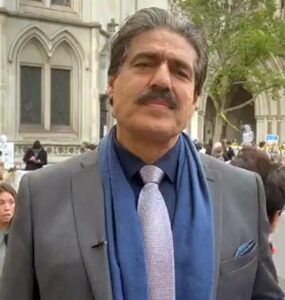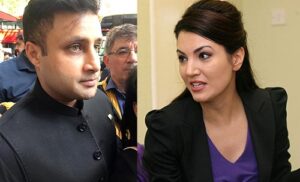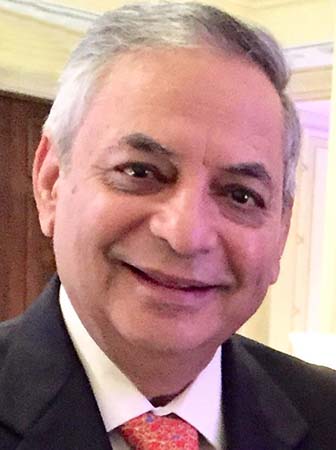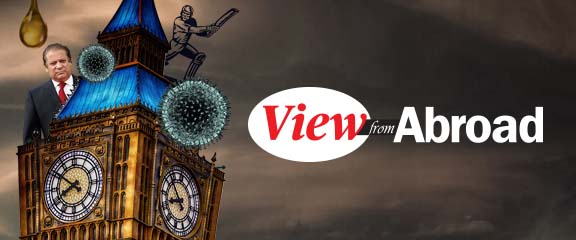“Nasir Butt has informed us, and we are prepared to accept, that he is not a multiple murderer, he is not an organised criminal nor a member of a drugs cartel, and he has not escaped justice in Pakistan….”
This is what New Vision TV (a.k.a. ARY) channel of the UK has said to a court in London in a defamation case.
To be honest, until this morning I had no idea that Nasir Butt, a PML(N) worker living in London, who is mostly seen tailing Nawaz Sharif, was not a multiple murderer, not an organised criminal, not a member of a drug cartel and that he had not escaped justice in Pakistan. How ignorant and naïve of me! I didn’t know anything about this man. I didn’t even know he was the Senior Vice-President of the UK Chapter of Pakistan Muslim League. It turns out he’s a person of considerable fame.
Once upon a time, Benazir Bhutto (Shaheed) appointed me the President of PPP Overseas, making me responsible for running the affairs of the PPP abroad. But nobody bothered to call me a multiple murderer or level other nasty allegations that New Vision TV did about the Senior Vice-President of the Pakistan Muslim League UK Chapter. So I never had the good fortune of filing and winning a defamation suit. How times have changed!
In order for someone to bring a case of libel or slander, generally called “defamation,” in court, certain bridges have to be crossed; these bridges are not very long or wobbly. One has to be shunned by people after hearing or reading that he is a “nasty” person. Nasir Butt is lucky that he was before an English court and not in a US court, where he would have had to establish malice on the part of ARY when they reported that he was a multiple murderer, an organised criminal and a member of a drugs cartel, and that he had escaped justice in Pakistan (we now know he is neither and the court has accordingly informed us). The US libel laws approach is that a person’s reputation is important and sacrosanct — but freedom of press is paramount.

If a journalist if forced to work in an environment of fear, and lands in controversies concerning celebrities, public figures or politicians — a hefty financial slap from the court might cost him or her their job. Given this reality, journalists would rather back off and prefer to write about less sensitive issues, such as the improprieties of animals.
Pakistani’s problems are oddly unique, when seen through the lens of the UK regulatory and legal prisms.
All Urdu language TV channels receive a readymade “bouquet” of recorded programmes that have already run in Pakistan or are being beamed live through satellite directly onto UK screens. Not a single TV channel in Pakistan has ever cared two hoots about what their guests utter on screen. Defamatory material sometimes becomes a welcome trigger for higher ratings, and hence false, derogatory, racist and illegal content keeps appearing on our screens on a daily basis. Most of this material is simply bundled up as a “bouquet” and sent to their UK channels directly, with there being no filter or pause to assess if the content going on air in the UK is legally compliant or not. I had previously suggested to my TV friends that they should have a vetting station at their base where a legal team, that knows UK Libel laws, could identify anything that is likely to be unacceptable in a foreign jurisdiction and potentially cause financial harm to the channel as a consequence of a libel suit.
‘No win, no fee’ or a Conditional Fee Agreement is yet another development in English law since 2013, which means that those who cannot afford the fee of the lawyers, agree to pay when the case is won. Libel, which in common parlance had been known as ‘the rich man’s game,’ then became anyone’s game — whoever could pay 10,000 pounds court fee could file a claim. I am not sure what Nasir Butt’s vocation is, but if he used a “no win, no fee” lawyer, he would have paid at least 10,000 pounds as court fee to start with.
Be that as it may, the scope of defamation has exponentially widened as a result of the staggering expanse of internet applications. Reham Khan’s allegations against Zulfi Bokhari, regarding the proposed sale of Roosevelt Hotel in New York, may have earned her the proverbial 15 minutes of fame but at the end of the day, each of those minutes made her very poor in a libel case before an English judge.

The factors of insufficient education, a culture of irreverence and a below par judicial system has somehow left us woefully exposed in foreign jurisdictions. Legal costs and the damages incurred can be back-breaking, particularly for someone with not-so-deep pockets.
The downside of the legal approach by the English courts, in my view, is that there is no scope for establishing the fame of a person; previous character is a non-issue, unlike in the criminal process where the defendant’s character plays an important role when it comes to sentencing. Don Corleone would have easily won a libel case if he was accused of being an accomplice in multiple murders, an organised crime head or chief of a drugs cartel.
Further, the law should not shroud the terms of the out-of-court settlement between parties so that the alleged offender bears the public effect of the pecuniary whip. TV companies must suffer the financial burden in such matters, so that instead of continuing with the present incompetence of the management and their disregard for the law, some sanity might prevail.
On another track altogether, internet companies like Facebook, Twitter, Instagram and other free-for-all public platforms also continue to enjoy unprecedented immunity for online libel posted by their users, not least because the world is still trying to understand how to rein in these global online monsters. Meanwhile, there is no excuse to allow the regulated, established industries of press and broadcasting to sully the reputation and lives of people from all walks of life in Pakistan and abroad on their shows and cause them immeasurable harm.

The writer is prominent lawyer, who divides his time between Islamabad and London.



